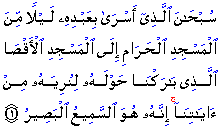General
From Issue: 291 [Read full issue]
| Living the Quran |
Al-Isra
(The Ascension)
It is not known exactly when the Night Journey and Ascension took place, but it was certainly before the Hijrah (emigration from Makkah) to Madinah. It was said to have happened either three years or 18 months before the Hijrah. Al-Isra was a land-to-land journey that Allah Almighty caused His Prophet (peace and blessings be upon him) to make from Makkah to Jerusalem, that is, from Almighty Allah's Sacred House to Al-Aqsa Mosque. Al-Miraj was a land-to-heaven journey from Jerusalem to the heavens. It was a journey to a place that no human being other than the Prophet (peace and blessings be upon him) had ever reached [or has reached since]. It was a journey to the Lote Tree of the utmost boundary, whose place only Almighty Allah knows. Such two journeys were a turning point in the Prophet's life and in the course of his call in Makkah, especially after all the suffering he (peace and blessings be upon him) had faced at the hands of the Quraysh. Allah Almighty wanted Al-Isra and Al-Miraj be an alleviation and relief to His Prophet (peace and blessings be upon him). He Almighty wanted to tell His Prophet that if the people of the earth had let him down, the people of heaven were there to support him; if the people of the earth had rejected his call, Allah Almighty would receive him and His Prophets (peace and blessings be upon them) would follow him and he would be their imam. We must believe that Allah Almighty is with us and that He Almighty will grant us victory and make Islam prevail, as He, Most High, always supports the true believers. That journey was an honour and compensation to the Prophet (peace and blessings be upon him) from Almighty Allah. It was also a preparation for him to the following stage of his call. A few years later, he (peace and blessings be upon him) would migrate to Madinah, where he (peace and blessings be upon him) would lead a life of strife and jihad and confront the Arab tribes and other parties that would stand as one man against his international call. Prophet Muhammad's being received by other Prophets of Allah Almighty in Al-Aqsa Mosque and his leading them in Salah (ritual Prayer) there indicates that leadership was moved to a new nation and to a new Prophethood. Source: |
| Understanding the Prophet's Life |
Having Shame On the authority of Abu Mas'ud, Uqbah bin 'Amr al-Ansari al-Badri, who
said: The Messenger of Allah peace be upon him said: The scholars have interpreted the words quoted in this hadith as:
Source: |
| Blindspot |
What’s in it for Me? Five Advantages of Hijab
Source: |
